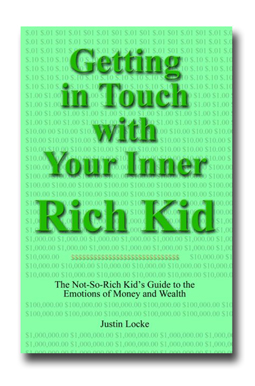In my latest book, “Getting in Touch with Your Inner Rich Kid,” I compare the emotional states of poor kids and rich kids. As I wrote it, I was well aware of the potential parallels and comparisons to Robert Kiyosaki’s best-selling book, “Rich Dad, Poor Dad.” Since his book is ostensibly about the different attitudes about money learned from poor parents vs. rich parents, I was worried that I might appear to be somehow copying his approach.
But once I did a little research and watched a video of Mr. Kiyosaki talking about his book, I quickly realized that this was not an issue.
Without getting into the value of his advice, or whether the “Rich Dad” ever existed, the notion of “Rich Dad, Poor Dad” is not, in my opinion, an accurate description of what he’s talking about. In his book, he is comparing an “Extremely Wealthy Businessman Dad” to a “Middle-Class Dad.” There is no “Poor Dad” anywhere in the book.
A “Poor Dad” has nothing to do with the numbers in a bank account. A “Poor Dad” is not simply someone who works in a salaried position. A true “Poor Dad” is someone who cannot hold a job. A “Poor Dad” is someone who is emotionally damaged, and perhaps one who abuses his kids, either physically or psychologically. A “Poor Dad” is often emotionally unavailable, or simply skips town altogether. A “Poor Dad” makes his kids feel like they are worthless. With a true “Poor Dad,” the lack of money is not merely a result of ineffectual management ideas, but a manifestation of broader emotional trauma.
So if you are a child of a true “Poor Dad,” your emotional issues regarding money are probably much more extreme than if you are child of a “Middle-Class Dad.” Converting yourself from a poor kid to a middle class kid (or even a rich kid) therefore requires considerably more effort. It’s not just an issue of acquiring financial literacy. There is also the need to heal the injuries that true “poor kids” endure, including overcoming one’s sense of not deserving any money at all.

Now at this point, I wish to remind everyone of a Principle of Applied Stupidity, in this case, “The dumber you look, the more stuff people will tell you.” After I posted the first version of this blog post, one of my fans pointed me in the direction of some very interesting articles regarding the “Rich Dad Poor Dad” books, including a question of whether the “Rich Dad” ever existed. Very enlightening! But for now I am not going to comment on the usefulness of Mr. Kiyosaki’s books beyond “caveat emptor.” My issue here is purely one of semantics. I just wanted to point out that I am trying to help a very different kind of person here, one who has a very different set of problems regarding the management of money.
© Justin Locke
